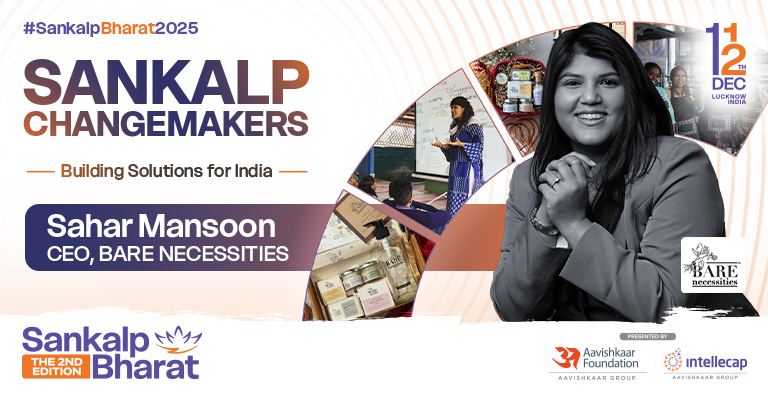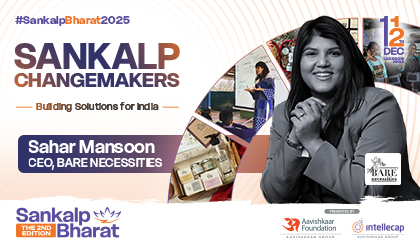

Reimagining Waste, One Bare Necessity at a Time #SankalpChangemakers features Sahar Mansoor, Founder of Bare Necessities
The Memory That Started a Movement
Growing up in Bangalore’s garden city, Sahar Mansoor spent weekends climbing trees in Cubbon Park with her father and sisters. Those early morning walks and nature-filled holidays planted seeds that would later bloom into something much larger than she could have imagined. When she lost her father at a young age, being in nature became her way of remembering him—and unknowingly, her path to environmental awakening.
The pivotal moment came in 2012 during her third year of college. In Professor Chris Chapples’s World Religions and Ecology class, she watched a video of Bea Johnson living a zero-waste lifestyle. Her first reaction? Complete dismissal. “How could she afford to shop at ‘Whole Foods’? Was she free enough to make her own products?” Juggling three jobs, maintaining scholarship grades, and navigating college life, zero waste seemed impossibly privileged.
Yet something stuck. That course became a turning point, nudging her to add environmental planning as her second major and dive deeper into our collective trash problem.
The Grandmother’s Algorithm
When Sahar finally began her zero-waste journey in April 2015, she found her most valuable resource wasn’t in trendy blogs or expensive stores—it was sitting in her own family history. Her grandmother became her “ready reckoner,” holding answers to questions that predated the plastic revolution: How did people wash their hair before shampoo came in plastic bottles? How did they clean their homes before chemical cleaners became the norm?
“Many Indian traditions are rooted in ecological practices, now known as ‘zero waste practices’,” she realized. The dabbawallas of Mumbai, operating since 18th century British India, were delivering home-cooked meals to over 200,000 people daily—creating 5,000+ jobs while producing zero trash. A model that puts modern food delivery apps to shame.
Her transition was incremental but intentional. When she ran out of soap, instead of buying store-bought alternatives, she learned to make her own. Each small step revealed a larger truth: we live in a world of “landfill-destined products.”
The 4.7 Billion Toothbrush Problem
The numbers hit hard. Every year, 4.7 billion toothbrushes end up in landfills, taking 200-700 years to begin decomposing. “So every toothbrush you and I have ever used is sitting on our planet somewhere,” Sahar points out. It’s a staggering visualization of our throwaway culture’s true cost.
This realization drove her to entrepreneurship. In 2016, she began Bare Necessities (formally registered in 2019), with a simple but powerful mission: create everyday necessary products that are entirely zero waste, covering everything “from the time you wake up to the time you go to sleep.”
Building India’s First B-Corp Zero Waste Brand
When Sahar formally launched Bare Necessities in 2016 (registered in 2019), her aim was simple: create everyday essentials without leaving behind everyday waste. The company grew into India’s first B-Corp certified, PETA-certified enterprise focused on zero waste.
Instead of positioning itself as another eco-friendly brand on the shelf, Bare Necessities set out to rethink how products are made, packaged, and consumed. From solid shampoos and conditioners to concentrated home cleaners, the company’s offerings are less about novelty and more about re-engineering daily habits.
Rethinking the Ordinary
Take home care: most liquid soaps and cleaners are over 90 percent water. Shipping that water across cities means unnecessary plastic and carbon emissions. Bare’s alternative is a powder-to-liquid format—concentrated refills that dissolve at home in durable glass bottles. Hand wash, dish wash, surface cleaners—everyday tasks, reimagined to cut waste at the source.
Personal care draws from the same philosophy. Ingredients like turmeric, coffee, or citrus peels are turned into soaps and scrubs, blending traditional Indian practices with modern design. The idea is less about luxury and more about sufficiency—making products that work while keeping packaging compostable, refillable, or recyclable.
Measuring Impact
Behind the brand’s storytelling is hard data. Since 2016, Bare Necessities has:
- Sold more than 340,000 products, preventing over 71 million units of single-use plastic from entering landfills or waterways.
- Diverted over 313,000 kilograms of waste from landfills.
- Reached more than 150,000 people directly through workshops and nearly 370,000 indirectly.
Beyond Products: Building Ecosystems
Bare’s collaborations also reflect its ecosystem mindset. Pouches are stitched from textile waste by underserved women. Partnerships with small enterprises like Mason & Co.(India’s first organic single-origin chocolate business that employs an all-women team) and PeopleKraft (provides upcycled pouches made from textile waste) show how circularity can extend across value chains. Bulk gifting for companies like Asian Paints and The Leela Palace demonstrates how sustainability can scale beyond niche consumers.
For Sahar, impact is not only about waste reduction but also about people. Women artisans who make Bare’s products receive fair wages, health insurance, and upskilling opportunities. Collaborations with groups like Hasiru Dala (supporting waste workers) and Maruvan (reforestation) embed the business in wider social and ecological systems.
Market Reality and Growth
Targeting India’s beauty and personal care market (projected to exhibit a CAGR of 5.60% during 2025-2033, reaching a value of USD 48.3 Billion by 2033 as per IMARC), Bare Necessities focuses on Tier 1 and 2 cities, primarily reaching women aged 18-50, especially new mothers seeking sustainable alternatives.
The company has raised capital from Social Alpha and notable angel investors like Prashanth Prakash, along with prestigious grants including the Cartier Young Leader Award and the Circular Economy Award by Adelphi in partnership with IKEA Foundation.
The Grandmother’s Legacy
What began as personal experimentation, guided by her grandmother’s household wisdom, is now part of a larger shift in how India imagines consumption. Bare Necessities doesn’t frame sustainability as sacrifice; it presents it as a set of small, practical choices that add up. Every refill, every handcrafted soap, every compostable pouch is an act of remembering—that solutions often lie in traditions we’ve left behind.
Editor’s Note: Sahar Mansoor joined us at the Sankalp Bharat Summit 2024 in Varanasi, where she reminded the audience that true circular economy solutions begin with reimagining waste as a resource. Her journey with Bare Necessities underscores how grassroots innovation and behavioural change can together shape sustainable futures.
Know someone building for India’s invisible challenges? Tag them below.
Want more stories like this? Follow #SankalpChangemakers and stay tuned for our next feature.




